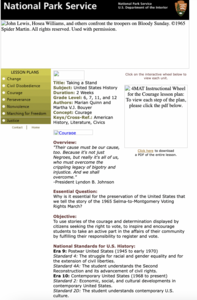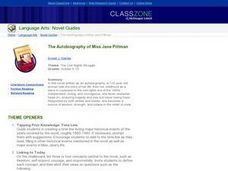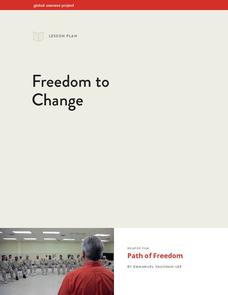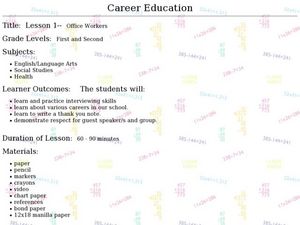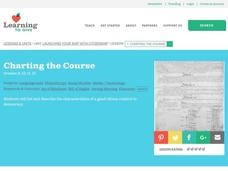Curated OER
Statistics
In this statistics learning exercise, 9th graders solve and complete 5 different word problems that include different data. First, they determine if there is an explanatory and a response variable in the given data set. Then, students...
Curated OER
Helping Ourselves: Why Philanthropy Works
Young scholars discover the concept of philanthropy. In this civics activity, students investigate the role of philanthropy in our society, and how it makes life better for all.
Curated OER
Bill of Rights: Rights and Responsibilities
Students explore the meaning of freedom. In this U.S. History activity, students research the Declaration of Independence and how it relates to American freedom by completing activities and a mock trial.
Curated OER
Interconnections Between Private and Civic Life -- Focus on the County
Middle schoolers distinguish between civic and public life. In groups, they identify the relationships between the two types of arenas as well. They research the roles of the Fairfax County government and how well they provide...
Curated OER
Taking a Stand - 1965 Selma-to-Montgomery Voting Rights March
Young scholars examine the 1965 Selma-to-Montgomery Voting Rights March. They view pictures reflecting their perceptions of their most important rights as citizens, write journal responses, create collages illustrating courage, and read...
Curated OER
Taking Things Personally
Students create a work of art calling attention to significant societal problems or social issues.
Curated OER
The Autobiography of Miss Jane Pittman: Novel Guides
Students create a timeline listing major historical events of the years 1860-1960. They discuss concepts central to the novel, such as freedom, self-respect, courage, and responsibility.
Curated OER
Earth: The Source of Resources
Students study responsible stewardship and natural resources. In this natural resources lesson, students share their motto's about the environment with the class. Students then discuss the regulations in 'Rules and Regulations for...
State Bar of Texas
Grutter v. Bollinger
A university decides not to allow a qualified scholar to enter its institution based on skin and gender—but this case is about a white female? The 2003 Supreme Court case Grutter v. Bollinger lays the foundation for open discussion and...
Center for Civic Education
What Is Authority?
Young scholars examine the concepts of power and authority as they begin learning about government in this elementary social studies lesson. Through a series of readings, discussions, and problem solving activities, children...
Curated OER
Debt: Who Does it Affect?
Debt is a topic that affects everybody: the community, the nation, and the entire globe. Kids take charge of debt by designing a project that informs those in their community about good financial choices, keeps personal debt low, and...
Curated OER
Development of Federal Civil Rights Acts : 1950's - Present
Students use the Internet to research one of five cases associated with Brown v. Board of Education and then join a group with people who researched the other four.
Global Oneness Project
Freedom to Change
Here's something unusual and thoughtful: have your scholars do some pensive reflection themselves before tackling how such meditative techniques are used in prison rehabilitation programs. They watch the...
Curated OER
Revolution! Freedom for All?
Twelfth graders examine the causes of freedom by revolutionary patriots. In this Civics and Economics lesson, 12th graders analyze primary sources. Students work cooperatively to write a freedom declaration for their group.
Curated OER
This Land Is Your Land
Students explore the many faces of America through the video, "This Land Is Your Land." They discuss places they may have visited and record their responses. Students create symbols that respresent the riches of America.
Curated OER
It's in Your Pocket
Learners examine American coins. In this American currency lesson, students study how American money came to be as well as the responsibilities of the U.S. Mint. Learners discover details regarding American coins and design their own coins.
iCivics
The Executive Command
Take on the role of president of the United States with this interactive online game, which will acquaint your learners with the various responsibilities of the executive branch of government. While not an in-depth or complex resource,...
Curated OER
Career Education: Office Workers
Frist and second graders explore career options. First they will watch career videos and then prepare to interview school personnel regarding their job responsibilities. They will then send thank you cards to the interviewed subjects...
Curated OER
Outstanding African Americans Activity
Challenge historians to investigate influential African-Americans through this online research activity. Learners undertake this task using online links, some of which require investigative searching. Print the worksheet out first, so...
Curated OER
Working Animals
Learners examine the need for the humane treatment of animals. In this animal welfare instructional activity, students realize the need for animal welfare, and decide on a service project that will promote it. The instructional activity...
Curated OER
Charting the Course
Students explore the concept of philanthropy. For this citizenship lesson, students collaborate to compile a list of the top ten traits of good citizens. Students then discuss random acts of kindness and create a plan to share kindness...
Curated OER
Wall of Philanthropists: King Day (7th)
Students recognize the importance of justice, tolerance, equality, and historical figures. In this philanthropic actions activity, students study the philanthropic actions of historical figures, and learn about the concepts of fairness,...
Curated OER
Lose a Vote, Gain a Vote
Students explore the issues behind close Senatorial races. They investigate the qualities of political leaders, the 2002 senatorial elections and the differences and similarities between the Republican and Democratic parties.
Curated OER
Science Under Control
Young scholars investigate and assess scientific issues for which government regulation has been or might be enacted. Using their research, students write letters to lawmakers supporting or contesting related legislative efforts.




